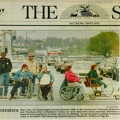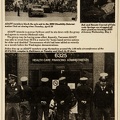[Headline] 300 activists protest at U.S. agency
[Subheading] ■Increased funding for at-home care of disabled sought.
By Meredith Schlow
Evening Sun Staff
Mike Auberger says he'd rather be jailed than placed in a nursing home.
"At least I know when I get out of jail it's a seven-day sentence, a 10-day sentence," the 36-year-old quadriplegic said.
"When you go into a nursing home, it's a life sentence."
Auberger and approximately 300 other disabled activists from 25 states picketed outside the Health Care Financing Administration in Woodlawn yesterday, protesting the lack of national policy to fund personal attendant services.
The protesters, members of American Disabled for Attendant Programs Today, want 25 percent of Medicaid's $23 billion, currently budgeted "in favor of nursing homes, to instead be budgeted for the establishment of community-based national attendant service programs.
Such programs, they say, would allow people with disabilities and the elderly to live independently in their own homes rather than in nursing homes. There are about 43 million disabled people in the United States, 1.5 million of whom would live in the community if attendant/personal assistance support services were available.
Auberger, who traveled from Denver for the protest, runs a home health care agency that employs about 90 people and provides care for approximately 150 disabled and elderly people in Denver and Colorado Springs.
[image]
[image caption] By Bo Rader — Evening Sun Staff. Members of ADAPT block entrances to the Health Care Financing Administration in Woodlawn during protest.
The fewer than half the states, including Maryland, have programs for in-home attendant services, according to Ellen Leiserson, an independent social worker who was previously program manager for the In-Home Aids Services for the state Department of Human Resources. Leiserson said that in Maryland, there are long waiting lists for those who wish to employ attendants.
"My level of disability would cost $60,000" a year in a nursing home, Auberger said. "Using attendant services, it costs $2,000 per month."
"We are not going to take it any longer," Wade Blank, co-founder of ADAPT, shouted through a speaker to an enthusiastic crowd.
"We will not be ignored . . . we will come again and again and again until nursing homes begin to lose their funding and people are allowed to live in their own homes."
A picket who identified himself only as "Bob," said that, while he isn't immediately in need of home attendant care, he doesn't know what the future holds.
"I don't want to give up my house I don't want to give up my garden," said the full-time engineer.
"I can't even visualize doing my job from a nursing home . . . they wouldn't even let me come and go without signed permission."
[image]
[image caption] ADAPT members block the sole exit to the HHS Disability Determination Unit at closing time Tuesday, April 30
[image]
[image caption] Bob and Renate Conrad of Colorado Springs are dragged off their positions blocking HHS driveway Wednesday, May 1.
ADAPT intends to pursue Sullivan until he sits down with the group and agrees to rewrite Medicaid rules.
The group may be having some effect: Recently, Tennessee ADAPT was able to wrest from HCFA a waiver for "home based service options for older and disabled" Tennesseans which had been tabled as recently as a month before the Washington demonstrations.
[image]
[image caption] Police line up as ADAPT members wrap themselves around the 1.08-mile circumference of the HCFA/SSA complex in Baltimore on Tuesday and block its 35 doors.
[Subheading] ADAPT protests at HCFA headquarters
Over 200 ADAPT activists took their fight against nursing homes to the nation's capital in April. Their targets: The Health Care Financing Administration which doles out Medicaid money to states (and which insists on giving the bulk of the dollars to nursing homes) and its parent Department of Health and Human Services.
Over 100 ADAPT wheelchair riders stormed the HCFA/HHS Disability Determination Unit complex in suburban Baltimore on Tuesday, April 30 and blocked the sole exit at closing time, forcing police to cut another road from the parking lot so employees could exit. On Wednesday the group took on HHS headquarters in downtown Washington, D.C. There were no arrests during the three-day action, and HHS Secretary Louis H. Sullivan continued to dodge the group. But that didn't stop ADAPT from making their point: that HHS redirect a fourth of its $23 billion budgeted for nursing homes to in-home services.
[two images]
[caption] Activists try to crawl under police barricades around HHS building Wednesday. Lee Jackson of Atlanta blocks driveway at HHS Unit. Photos by Tom Olin
[Subheading] Disabled vets demonstrate
[image]
[image caption] Some 300 disabled activists from 25 states, including more than 100 in wheelchairs, block entrances to the Hubert Humphrey Building on Independence Avenue SW, headquarters of the Department of Health and Human Services, for almost five hours yesterday to protest policies they say favor nursing homes over home care.
Photo by Willard Volz The Washington Times
THE EVENING SUN, WEDNESDAY, MAY 1, 1991
[Headline] Disabled protesters b lock HCFA workers
[Subheading] Demonstrators make a point about freedom.
By Meredith Schlow
Evening Sun Staff
Ruth Stringfellow's car was only about 50 feet from the exit of the Social Security Administration and Health Care Financing Administration building when the group of dis-abled demonstrators blocked her in.
"I almost made it," she said sadly, looking out toward Woodlawn Road.
Yesterday, for the second day in a row, demonstrators protested federal rules that they say relegate many of them to nursing homes when they should be able to live on their own.
The government, they said, should shift money in the Medicaid health program, which serves the poor and disabled, away from nursing homes and toward payments to attendants who can care for the disabled in their own homes.
Protesters were members of the national group Americans Disabled for Attendant Programs Today.
While Monday's demonstration was generally uneventful, yesterday's, which began just before 3 p.m., prevented employees from the two offices from leaving for several hours after their work day was complete.
Demonstrators said they wanted to show able-bodied people what it's like to have the privilege of freedom taken away, something they say happens every day inside nursing homes.
"It's the same kind of feeling -you can't leave when you want to. You need my permission," said Mike Auberger, who traveled from Denver for the protest.
Although employees expressed anger and frustration over their in-ability to leave work, some said that they still felt respect for the protesters' cause. Most said that the demonstration was held in the wrong location, however.
"I can understand what they're protesting about, but there's nothing we can do about it here — they should be where the politicians are," said one woman who declined to give her name.
"They have a legitimate com-plaint, but I think they should be in D.C.," agreed Pauline DeVance.
But protester Nate Butler said the Woodlawn employees are an "integral part of a system that's really oppressive."
"I'm sympathetic to all these folks not able 0 get home, but this is a really miner inconvenience com-pared to the inconveniences suffered by those in nursing homes," he said.
By 4:30, Baltimore County police had created a makeshift exit behind the building into the Knight's Inn parking lot, through which employees departed, one car at a time.
Police were reluctant to arrest protesters because their disabilities make them more difficult to trans port and house, according to Baltimore County police spokesman Sgt Steven Doarnberger.
- Created on
- Friday 12 July 2013
- Posted on
- Thursday 8 November 2018
- Albums
- Visits
- 584
- Rating score
- no rate
- Rate this photo


0 comments